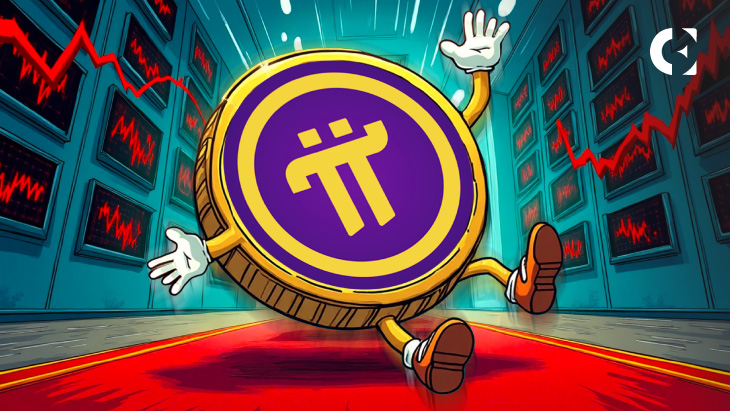- Over 89% of Pi tokens remain under the control of the Pi Core Team.
- An analyst claims the Pi project lacks audits, transparency, and major exchange listings.
- They compare Pi’s risks to Terra Luna’s collapse in 2022.
Pi Network is drawing sharp criticism from crypto analyst Szymanski over what he describes as the project’s alarming level of centralization.
A primary concern, according to Szymanski, is that the Pi Network development team; the Pi Core Team, reportedly maintains control over nearly 89% of the total Pi Coin supply. This situation has prompted fears among some market watchers of a potential, severe collapse.
Analyst Raises Red Flags Over Pi Network’s Token Distribution
In a tweet, analyst Szymanski sounded an alarm about Pi Network, claiming that the Core Team controls the vast majority of Pi’s total token supply. Of the 100 billion Pi tokens that will ever exist, only 11 billion have been released to date. From this, 7.1 billion tokens are in circulation, while 89 billion remain locked under team control.
Related: Pi Network Price Surge: PI Coin Flips HBAR, TON; Top 10 Crypto Next?
Szymanski didn’t mince words, calling this degree of centralization a “ticking time bomb.” He warned that any large-scale liquidation, whether planned or forced, could cause a market crash similar to what occurred during the Terra Luna collapse in 2022.
Meanwhile, Pi is trading at $0.8672, a 0.17% rise in the past day. The token has seen a 17% rise in the past week, increasing the monthly uptick to 40%.
Lack of Audits and Transparency Deepens Concerns
Szymanski’s critique, however, doesn’t stop with token distribution. He criticized the network for its lack of transparency and absence of third-party audits. Unlike Bitcoin, which relies on decentralized mining, all Pi tokens are pre-minted. These tokens, Szymanski reports, are stored in a single centralized wallet managed directly by the Pi Core Team.
He further stated that the Pi team has not subjected its codebase or any smart contracts to public or professional review. This absence of audits has fueled speculation and skepticism within the crypto community. According to the analyst, the Pi team has not subjected its code or smart contracts to any public or professional review.
Major Crypto Exchanges Steer Clear, Limits Pi Coin Liquidity
Compounding these issues, as Szymanski pointed out, is Pi Network’s continued absence from top-tier crypto exchanges like Binance, Coinbase, Kraken, or Bybit. Szymanski noted that this could be due to the project’s centralized nature and lack of compliance with standard listing practices.
Without listings on such major crypto exchanges, Pi Coin users find themselves with very limited liquidity options and few established avenues to realize or trade the value of their holdings.
Szymanski Outlines Constructive Path for Pi Network: Roadmap, Audits, Decentralization
Despite these strong criticisms, Szymanski did offer a path forward for the Pi Core Team to address these concerns and build trust. He suggested they could start by releasing a clear roadmap, allowing independent audits, and decentralizing control over token supply.
Until those changes are made, he urged potential investors to “do their own research” and approach the project with caution.
Pi Network Project Background and Market Context
Pi Network first appeared in 2019, launched as a mobile mining initiative that aimed to make crypto more accessible to the average user. It quickly gained popularity, amassing a global user base. However, years later, it has yet to launch a public mainnet or secure listing on some exchanges.
Related: Pi Network Token Unlock Impact: PI Price Tumbles, $7.6B Market Cap Tested
The debate over Pi’s legitimacy continues to divide the crypto community. Some users remain optimistic about its potential, while critics argue that the lack of transparency and decentralization makes it a risky bet.
Disclaimer: The information presented in this article is for informational and educational purposes only. The article does not constitute financial advice or advice of any kind. Coin Edition is not responsible for any losses incurred as a result of the utilization of content, products, or services mentioned. Readers are advised to exercise caution before taking any action related to the company.









